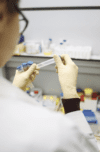For the past several months, the world has been struggling to contain the spread of COVID-19 and effectively treat patients diagnosed with this disease. It is a new strain of coronavirus that researchers continue to learn more about every day. One thing that is known about the virus is that individuals with underlying health conditions are at increased risk of developing severe illness and complications.
One such underlying health condition that researchers are paying closer attention to is type 1 diabetes (T1D). Preliminary research from small studies appear to show that individuals with T1D are at increased risk of poorer health outcomes than those with type 2 diabetes (T2D) or no history of diabetes. A recent study of 64 individuals with T1D and confirmed or suspected COVID-19 in the United States found that “more than 50% of all cases reported hyperglycemia, and nearly one-third of patients experienced DKA.” Both hyperglycemia and diabetic ketoacidosis (DKA) can be life-threatening conditions if not properly treated in time.
Furthermore, research released from the United Kingdom’s National Health Service (NHS) revealed that hospitalized individuals with T1D are significantly more likely to die from COVID-19 than those with T2D. Scientists believe that hyperglycemia may enhance the immune system’s overresponse thereby exacerbating the impact of severe infections.
Being hospitalized can make it more difficult for individuals with T1D to maintain glycemic control because their body is already trying to fight off infection, and they may not have the mental clarity or ability to effectively monitor their own blood sugar. Diabetes Research Connection (DRC) sponsored a study by Addie Fortmann, Ph.D., regarding the use of continuous glucose monitors (CGMs) in hospital settings, which found that these devices were pivotal to glycemic control. As a result, Scripps deployed this technology across all of their hospitals to better support diabetes management.
But not every hospital in the United States allows patients to use their CGM while admitted, and not all staff is adequately trained in diabetes care. This can complicate things for patients struggling with T1D as well as COVID-19 and contribute to poorer health outcomes. Not only are patients fighting against the effects of COVID-19 including fever, shortness of breath, dry cough, nausea, body aches, and fatigue, if their blood sugar should go too high or too low, this can add to more symptoms and complications. In both patients with confirmed and suspected COVID-19 as well as T1D, DKA was the most prevalent adverse outcome.
It is essential that attention is given to managing underlying conditions such as diabetes in order to provide more effective treatment tailored to patient needs. Since 2012, the DRC has been providing critical funding for early-career scientists pursuing novel, peer-reviewed research related to type 1 diabetes. This work is essential to advancing understanding of the disease, improving prevention strategies and treatment options, minimizing complications, enhancing quality of life, and working toward a cure. Learn more about current projects and how to support these efforts by visiting http://localhost/drc.




